Whether you’re an individual, a small business, or a large corporation, it helps to be funny on social media. We all love to share things that make us laugh.
That’s why funny posts often go viral. But people can’t get the joke, if they’re not in your audience. Let’s get them there with a dash of Hashtag Humor.
Without hashtags, your audience may consist of your brother, best friend, high school crush and mother-in-law.

Popular, relevant hashtags will help expose your post to more people — like-minded social media users and maybe even potential customers. If you have a chuckle-worthy photo to share on social media, such as Instagram or Twitter, give it a boost with a hashtag or two.
Funny Hashtag or Funny Content?
Some hashtags aren’t inherently funny. The hashtag #funny won’t make you laugh, but will lead you to funny places when you click on the link.
#twothingsthatdontmix hints of humor to come.
On Instagram, if you type in that hashtag in the search box, you’ll end up on a page with all kinds of funny things that people think shouldn’t be put together. If you click on one of the images, you’ll see the related description and funny hashtags that go with it.
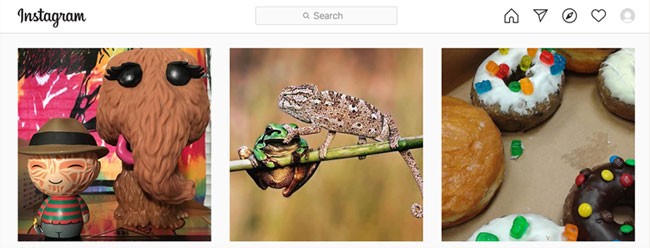
Use a Search Box to Find Hashtags.
Go online and try putting in a hashtag like #twothingsthatdontmix into the search box on any social site. Hashtag humor is around every corner. Once you start searching, you’re bound to stumble across one you could incorporate into your own content.
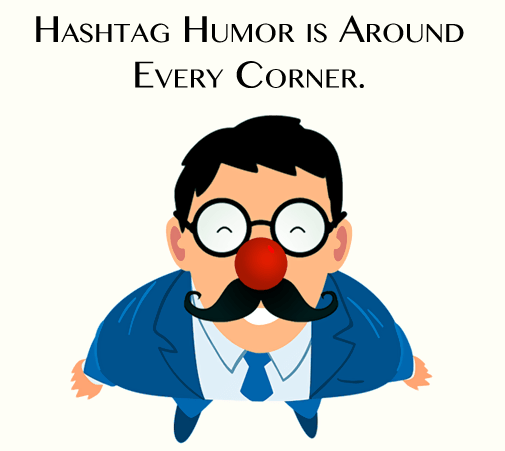
Type a phrase into a search box and see what comes up. Be sure to start with a hashtag (#) and leave out spaces between the words you choose.
- From New England? Try #WickedGood.
- From Maine? Type in #OnlyInMaine or #Lobstah.
- From New Hampshire? Try #CowHampshire.
Make up your own Hashtags.
You can create your own hashtags. There’s no formal steps in creating one. Nobody owns them. You can create one from a pun, quote, tagline etc. to make your amusing photo even more comical. The possibilities are endless.
NOTE: If you make up an original hashtag from a phrase that you find funny, it won’t increase your exposure online… UNLESS other people start using it.
- #dogsarebetterthanpeople
- #gooeyontheinside
- #mycookiesarebetterthanyours
- #onlyinmainedotheysayjimmies
This is exactly what large brands try to accomplish when they come up with a unique hashtag for a campaign. They hope others will start using it, giving it the chance to go viral.
You may be wondering “Am I funny enough?”
We all hope to amuse others, while not annoying or offending anyone. It helps to try subtle, gentle humor at first. Also, keep in mind that humor is subjective. Different styles appeal to different types of people.
Do bobble heads, wind-up chattering teeth and whoopee cushions make you laugh? Type in #bobbleheads, #chatterteeth or #whoopeecushion.
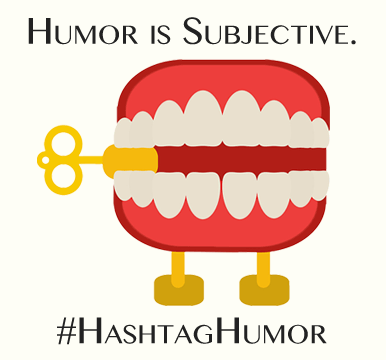
#redneckerthanyou and #wifeonashelf are on the edgier side. There’s a fine line between edgy humor and poor taste. Brands work hard to stay on the right side of that line. Individual users don’t have to try as hard. Our friends will probably just ignore something they consider to be in bad taste.
But, no matter who you are, you’re better off trying to subtly incorporate pop culture events and trending topics into your social media rather than using old-fashioned pranks or “yo mama” jokes (#yomamajokes).
Hashtags for Small Business
Humor can be an effective way to reveal the human side of a company, large or small. But business owners need to observe their target audience to make sure their humor fits. Companies are held to a higher standard than the average social media user. If you own a small business, read “Social Media Hashtags: Small Business Quick Start Guide.
Small business owners ask themselves, “Is this funny enough? Will it show the human side of our company without offending our target audience?”
- #shopshenanigans
- #makingdealsspinningwheels
- #puttingdreamsindriveways
Hashtags for Organizations
Organizations of all shapes and sizes can benefit from social media humor. In fact, comedy is a tool that public utilities, non-profits, and even law enforcement agencies can leverage to connect with people in their community.
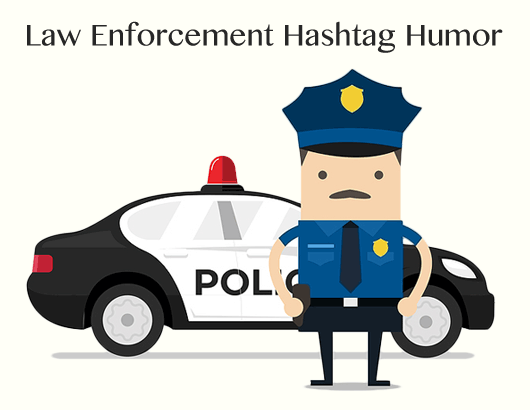
Zachary Police (@PoliceZachary)
This police department often uses light hashtag humor on Twitter to poke fun at criminals and wanted fugitives.
- #CriminalsNeverForgetTheirMasks
- #MisdemeanorMonday
- #TippingisntSnitching
When they received a report of chickens crossing the road, they posted a funny tweet with the hashtag: #NoFowlPlaySuspected.
Brand Humor
Large brands often create unique hashtags and use them in campaigns. Most try to keep their humor family-friendly. They use hashtags to entertain their followers while encouraging them to share their funny posts and their product. Funny hashtag campaigns, like these, employ a subtle form of marketing.
CHARMIN (@Charmin) EXAMPLE
Charmin is a great example of a brand that uses a “social humor / hashtag humor combination” in a way that disguises its sales approach. Toilet paper is not particularly funny when you see it on a store shelf, but if you’re a brand that can find the humor in it and get others to participate in the fun (while using your hashtag), you’ve created a successful hashtag campaign.
Charmin’s Famous Hashtags: #EnjoytheGo, #TweetFromTheSeat
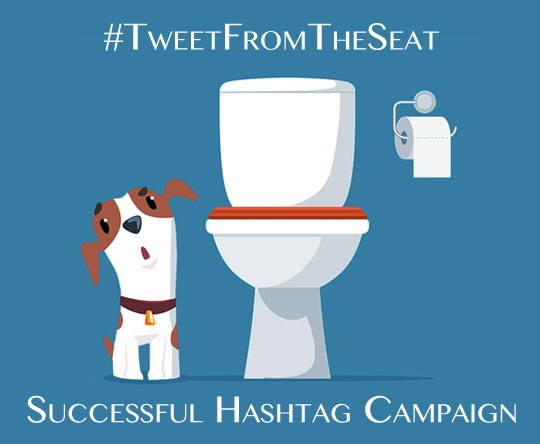
AXE (@AXE) EXAMPLE
Unilever’s AXE launched a humorous 2020 Twitter campaign to show how young men, spending extended time alone and neglecting their personal hygiene during the pandemic, could re-emerge back to normal life with the help of their products.
AXE’s Campaign Hashtag: #SmellReady
Brands ask themselves, “Is our attempt at humor actually funny? Is our hashtag unique, memorable and in good taste? Is the timing right?”
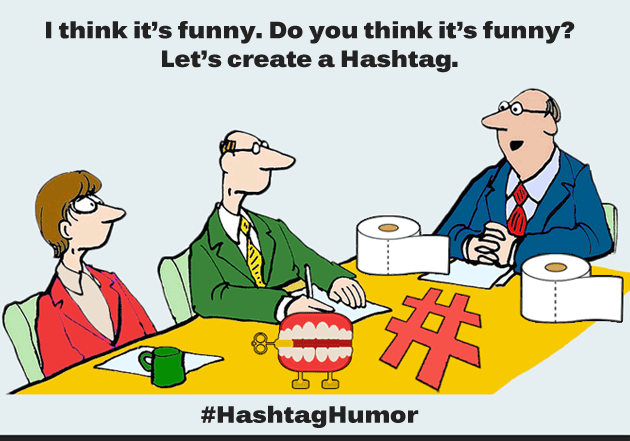
HASHTAG CAMPAIGN FAILS
If brands launch an unsuccessful hashtag campaign, they may receive backlash, fall victim to hashtag hijacking or even suffer a social media boycott attempt.
The Kraft Heinz brand tried to use tongue-in-cheek humor when they introduced a hashtag campaign (during the COVID-19 pandemic) that was tied to National Noodle Day. In it, the brand urged customers to give boxes of their comfort food: “Kraft Mac & Cheese” to loved ones.
Kraft’s Campaign Hashtag: #SendNoods
But it prompted backlash from parents who found the joke “offensive.” They had unwittingly crossed that line with their target audience. Kraft has since tried to remove all traces of the campaign and associated hashtag throughout social media.
Summary
Social media humor with relevant, humorous hashtags, will encourage conversations and sharing if your target audience agrees with you. When something strikes social media users as funny, they’ll pause and take a closer look. If you can tickle their funny bone, your post may go viral.
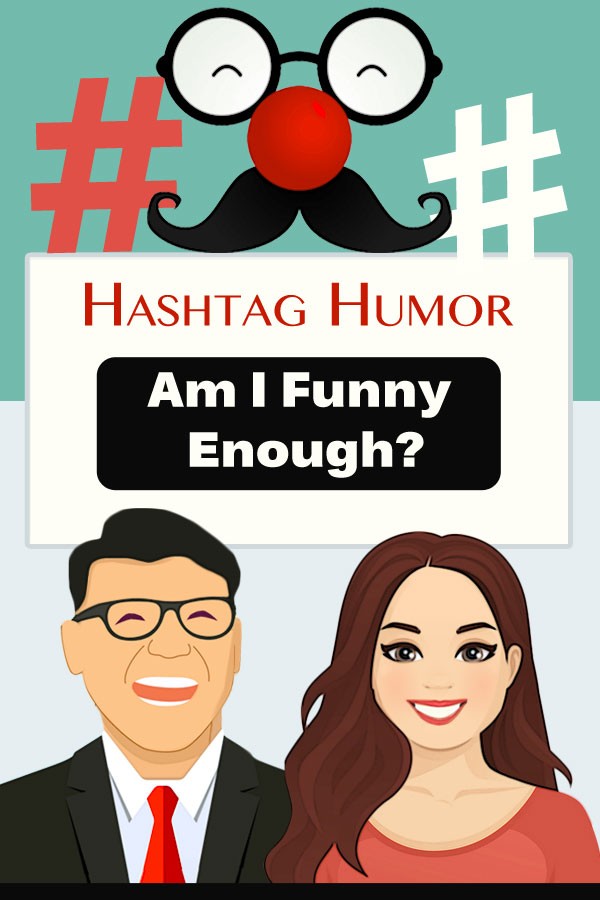

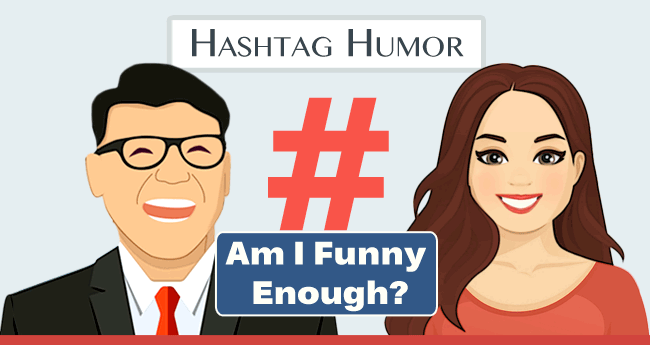
Return to Top